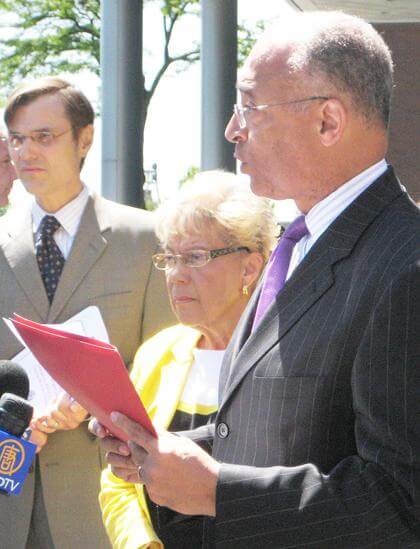By Ivan Pereira
City Comptroller William Thompson and Borough President Helen Marshall pleaded with the state and city Monday to provide Queens’ overcrowded hospitals with more resources in order to combat serious health threats, such as swine flu.
Speaking outside Jamaica Hospital’s emergency room, Thompson unveiled the findings of a new report issued by his office that examined the borough’s hospitals since the closing of Mary Immaculate and St. John’s Hospitals in February. The comptroller said emergency rooms were overloaded and ambulance turnarounds are longer at the Queens medical centers.
“Our health care system has been threatened like never before,” he said.
The comptroller and Marshall said the swine flu outbreak, which has killed two Queens residents and sent dozens more to the hospital, has created a heavier burden for the borough’s medical centers and doctors during the last couple of weeks. Last week, Jamaica Hospital’s emergency room saw 663 patients with flu−like symptoms, double the normal patient intake, according to the borough president.
Mitchell Wiener, a Flushing resident who had been an assistant principal at IS 238 in Hollis, died from complications of swine flu, though contributing factors to the death were obesity, hypertension, and heart disease, according to a spokeswoman for the city medical examiner. The other victim was an unidentified woman who had other health problems, according to the city Department of Health.
As of press time Tuesday 538 New Yorkers have been diagnosed with swine flu and of those, 229 were hospitalized, according to the Department of Health.
Jamaica Hospital has leveled out some of its ER visits by setting up two triage units outside the hospital dedicated specifically to treating patients with flu−like symptoms, but Thompson warned the situation at Jamaica and other hospitals could get worse without additional resources.
“This is only going to snowball,” he said.
In his report, the comptroller, who is running for mayor, laid out several recommendations to improve efficiency at the hospitals. Thompson called on the state to bring additional staff from outside the city to Queens to handle the extra patients at the area hospitals.
He also called on the state to provide the borough medical centers with loans and working capital to cover expansion costs at the borough hospitals. Thompson said several medical centers have been having trouble borrowing money due to the recession and rough credit market.
“By asking those hospitals that are financially challenged and that are near the two that closed to spend money they do not have, [the state Health Department] is threatening the very survival of those hospitals,” the comptroller wrote in his report.
Thompson and Marshall’s conference came after the city reopened the last of the 29 public schools that were closed due to swine flu concerns. Classes resumed at P811 in St. Albans Monday morning after it was shut down for four days last week when six students came down with flu−like symptoms, according to the city Health Department.
Marshall said she hopes the city and state would act on Thompson’s report because the hospitals were being too overcrowded after the closing of Mary Immaculate and St. John’s.
“When this pandemic hit us, it became worse,” she said of the cluttered ERs. “Really and truly we need help.”
Reach reporter Ivan Pereira by e−mail at ipereira@cnglocal.com or by phone at 718−229−0300, Ext. 146.



































